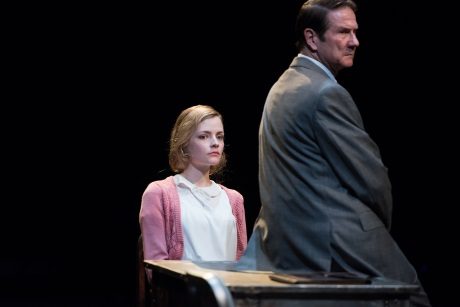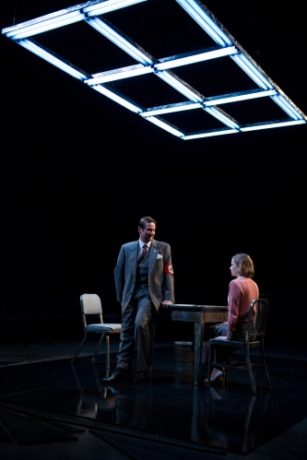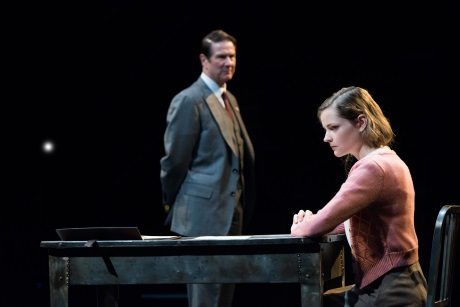David Meyers’ We Will Not Be Silent places American audiences within an interrogation room in Nazi Germany in 1943. Leaders of the White Rose, one of several resistance groups to Hitler and his Third Reich, have just been arrested.

The show trial will soon begin.
We Will Not Be Silent offers an intellectual proposition: for what might you be willing to die? Although the Nazi ground is well trod, questions like this one are always worth the offering.
Meyers’ intelligent play does not, however, sustain the emotional underpinning that must accompany such an exploration: these lives that will be sacrificed on the altar of fascism do not resound with much intensity.
By play’s end, we understand the heroism resistance to tyranny inspires but without experiencing the deprivation such heroism entails.
At the center of this interrogation drama sits Sophie Scholl (Lexi Lapp), a young religious studies student at the University of Munich. She and her brother have been arrested for distributing the White Rose’s anti-Nazi pamphlets.

Her interrogator, Kurt Grunwald (Paul Deboy), wants a confession; he wants names and addresses; and he also wants to soothe his own conscience. For he, like many people in similar situations, is following the Nuremberg Defense: he’s simply following orders, for his country, for his family, for his career, for his own self-preservation.
The dramatic problem with this interrogation lies in its lack of dynamism: the stakes are not made clear enough for Sophie or for Kurt. As a result, the stress they experience never reaches dire proportions.
There are few surprises in We Will Not Be Silent. During the back and forth between Kurt and Sophie, we learn only the most general of personal information about them. From the little we do learn, we yearn for more.
A part of the issue seems to be that Meyers relies too heavily on Hitler and his regime as an icon of evil: particulars, as they would have been experienced by Sophie or Kurt, are not addressed.
For example, historically when the Gestapo executed a dozen communist activists in 1942, the White Rose was spurred to make their intellectual challenge to fascism more public: they became more active and took more risks.
Such details might have humanized Sophie and the White Rose and allowed the audience to know her more intimately.
When James Chaney, Andrew Goodman, and Michael “Mickey” Schwerner were murdered in Mississippi for their Freedom Summer activities, they didn’t fully understand the true dangers they were facing. But Sophie and her comrades surely did.
Yet, this production, directed by Ed Herendeen, fails to sufficiently manifest those dangers and the degradation that torture inflicts upon the human psyche.

Ms. Lapp’s Sophie embodies the privileged university student that she is and her seemingly innocent idealism, but the existential anguish she experiences during her several days of torture is less clear: we are not allowed to experience her struggle to maintain her dignity and resolve in the face of the guillotine.
Mr. Deboy faces a similar challenge, as Meyers’ writing does not surface the true depths of his ethical dilemma and the emotional struggle such a dilemma imposes on the psyche. During our own McCarthy era, when careers were ruined if not lives lost, if those charged with interrogating and rooting out the evil of communism didn’t truly believe in the efficacy and nobility of their actions, then anguish ensued. As a seasoned interrogator, one can only assume that something about Sophie and her impending execution motivates Kurt’s willingness to risk danger and possible death.
The other two actors, Lucky Gretzinger as Sophie’s brother Hans and Scott Cooper as the Guard, have an easier time of it as their characters do not embody this type of inner turmoil.
The production team, led by Set Designer Frank J. Oliva, has kept the scenography basic. Theresa Bruck’s costumes are simple and stylish, with Deboy’s suit standing out as iconically powerful. Lighting designer Tony Galaska has added some dramatic effects, as has Sound Designer Justin Ellington.
Risking your life, your family, or your career to do what is right is always worthy of representation, whether that courage is witnessed in Germany, in China, in Israel, or in the United States.
Hitler and the atrocities committed by the Third Reich are well-covered ground. Thus, the storyteller who ventures into that territory needs to have a unique perspective on the terrain.
With the recent growth in America’s national security state and the militarization of its police forces, and the birth of drone warfare, such concerns have revived meaning. Perhaps, if Meyers had found a way to make those connections to the present, his 70-year-old story would have resonated more fully.
Running Time: 90 minutes, with no intermission.
We Will Not Be Silent and The Contemporary American Theater Festival (CATF) continue through July 30, 2017. Tickets to CATF and for Wild Horses can be purchased through the Theater Festival Box Office, by calling (800) 999-CATF (2283), or by purchasing them online.





Thanks for this review. As a historian and writer (and I imagine a playwright sharing a 70 year old story), it is difficult to make lessons from the past relevant. Yet, it is our task. I wonder how David Meyers could have done this and look forward to seeing “We Will Not Be Silent.”
“With You There Is Light”, a book I finished after over thirteen years and involved research of primary archival material in German, contains a unique but unpopular perspective on German resistance during World War II. It involves not the Gestapo – but the German Army.